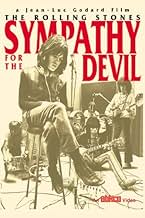IMDb RATING
6.2/10
3.4K
YOUR RATING
While The Rolling Stones rehearse "Sympathy for the Devil" in the studio, Godard reflects on 1968 society, politics and culture through five different vignettes.While The Rolling Stones rehearse "Sympathy for the Devil" in the studio, Godard reflects on 1968 society, politics and culture through five different vignettes.While The Rolling Stones rehearse "Sympathy for the Devil" in the studio, Godard reflects on 1968 society, politics and culture through five different vignettes.
Sean Lynch
- Commentary
- (voice)
Keith Richards
- Self - The Rolling Stones
- (as Keith Richard)
Frankie Dymon
- Black power militant
- (as Frankie Dymon Jnr.)
Tommy Ansah
- Black power militant
- (as Tommy Ansar)
- Director
- Writer
- All cast & crew
- Production, box office & more at IMDbPro
Storyline
Did you know
- TriviaThe producer of the film added film of The Rolling Stones performing the completed version of "Sympathy for the Devil" at the end of the movie in an attempt to make it more commercial. Jean-Luc Godard was so incensed by this that he punched the producer during a talk at London's National Film Theatre.
- Alternate versionsJean-Luc Godard's original director's cut (titled "One Plus One") runs approximately 110 minutes and consists largely of additional footage of the black power militants. The film's producers were dissatisfied with this cut and deleted 11 minutes, changed the title to "Sympathy for the Devil" to underscore the Stones connection, and added the final version of the title song to the film's soundtrack, over a freeze-frame of the last shot. These changes were all made without Godard's knowledge; when he finally saw them at the film's London Film Festival premiere, he allgedly went berserk and physically attacked one of the producers.
- ConnectionsEdited into Histoire(s) du cinéma: Une vague nouvelle (1999)
Featured review
One of Nouvelle Vague iconoclast Jean-Luc Godard's most engaging oddities, part music documentary of the Rolling Stones rehearsing and recording "Sympathy for the Devil", part a collage of sketches on modern-day revolution and the struggle of the minorities for freedom, punctuated by a number of double-entendre title cards. Generally ranged alongside Godard's political work of the late sixties, it's in fact a cynical and very twisted meditation on the politics of minorities, since the director equates women's lib, communism, fascism and the Black Panthers' radicalism at the same level, all while the Stones find a way to tell the Devil's take on the history of civilization. Mostly, it's questioning what real impact can theoretical concepts of revolution have in a world where language obscures as much as it shares, as is acutely pointed out in the Black Panther's interview where, once asked how are they going to communicate their aspirations to the white man, the black revolutionary replies he has no idea since black men and white men don't really speak the same language. Is music, then, the universal language that everyone speaks? Godard says nothing. He prefers to film, in very long and beautifully executed tracking one-takes, either the Stones rehearsing in a candid manner, or the various revolutionaries spouting their ideals out loud, while a cynical voiceover reads excerpts of pulp novels with the names replaced by those of post-war politicians. It is, in fact, "one plus one": one half rock documentary of interest to Stones fans, one half political satire and commentary. The beauty lies in mixing them together, but I'll admit that only a hardcore Godard fan can enjoy and make sense of the combination.
Details
- Release date
- Country of origin
- Language
- Also known as
- The Rolling Stones: Sympathy for the Devil
- Filming locations
- Battersea Railway Bridge, Battersea, London, England, UK(car wreck by the Thames)
- Production company
- See more company credits at IMDbPro
- Runtime1 hour 51 minutes
- Sound mix
- Aspect ratio
- 1.66 : 1
Contribute to this page
Suggest an edit or add missing content
































